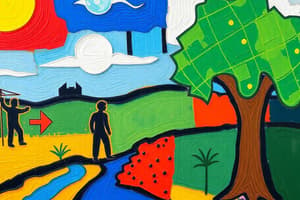Podcast
Questions and Answers
What defines a contemporary issue?
What defines a contemporary issue?
- An issue that existed before the 20th century
- A subject that is not widely discussed in society
- An issue that only affects individuals
- A problem currently relevant to public discourse (correct)
Which of the following is NOT a characteristic of a primary source?
Which of the following is NOT a characteristic of a primary source?
- Includes items like letters and journals
- Original accounts of events
- Written by someone who experienced the event
- Interpretations based on primary sources (correct)
How is a conclusion best defined in the context of reasoning?
How is a conclusion best defined in the context of reasoning?
- A theory based on inferencing processes
- A statement describing relationships based on evidence (correct)
- An educated guess about an uncertain outcome
- A summary statement that reflects generalization
Which of the following examples represents secondary sources?
Which of the following examples represents secondary sources?
What distinguishes fact from opinion?
What distinguishes fact from opinion?
What is an inference in the context of reasoning?
What is an inference in the context of reasoning?
Which type of natural disaster is associated with geologic processes?
Which type of natural disaster is associated with geologic processes?
What period does contemporary history cover?
What period does contemporary history cover?
Which department is responsible for managing local government units in the Philippines?
Which department is responsible for managing local government units in the Philippines?
Which department is tasked with protecting the environment and natural resources of the country?
Which department is tasked with protecting the environment and natural resources of the country?
What is the most abundant gas in our atmosphere that contributes to cloud formation?
What is the most abundant gas in our atmosphere that contributes to cloud formation?
Which province is at risk for earthquake-induced shallow landslides?
Which province is at risk for earthquake-induced shallow landslides?
Which department is responsible for health services in the Philippines?
Which department is responsible for health services in the Philippines?
Which region is susceptible to typhoons according to the risk assessment?
Which region is susceptible to typhoons according to the risk assessment?
Which of the following gases is released from natural processes such as breathing and volcanic eruptions?
Which of the following gases is released from natural processes such as breathing and volcanic eruptions?
Which department oversees major infrastructure projects in the Philippines?
Which department oversees major infrastructure projects in the Philippines?
What condition characterizes La Niña?
What condition characterizes La Niña?
What natural disaster may occur due to heavy and continuous rainfall in high areas?
What natural disaster may occur due to heavy and continuous rainfall in high areas?
What is one of the primary activities that contribute to soil erosion in low-lying areas?
What is one of the primary activities that contribute to soil erosion in low-lying areas?
Which of the following describes the role of the NDRMMC?
Which of the following describes the role of the NDRMMC?
How does the disposal of waste in waterways contribute to flooding?
How does the disposal of waste in waterways contribute to flooding?
What scale is used to measure the intensity of earthquakes?
What scale is used to measure the intensity of earthquakes?
Which of the following is NOT a consequence of living near volcanoes?
Which of the following is NOT a consequence of living near volcanoes?
What is a behavior that increases risk during natural disasters?
What is a behavior that increases risk during natural disasters?
Flashcards are hidden until you start studying
Study Notes
Concept of a Contemporary Issue
- Contemporary World: Refers to the period from the 20th century to the present.
- Contemporary History: Time frame between the 20th century and today.
- Issue: Subjects, themes, or problems impacting society through discourse and debate; not all are negative.
- Contemporary Issue: Relevant subjects or problems that are currently discussed in community, nation, or global contexts.
Skills Needed in the Study of Contemporary Issues
- Primary Sources: Original accounts such as letters, journals, legal documents, and photos created by those who experienced events.
- Secondary Sources: Interpretations from primary sources, created by individuals not directly involved in events, such as hearsay reports or texts.
- Fact vs. Opinion:
- Fact: Supported by evidence; reflects actual events or data.
- Opinion: Individual ideas or conjectures without empirical support.
- Inferences, Generalizations, and Conclusions:
- Inference: Educated guesses or theories.
- Generalization: Mental connection of information into summary statements.
- Conclusion: Relationship description among information after thorough analysis.
Natural Disasters: Risk Reduction and Management
- Natural Disasters: Adverse events from Earth’s natural processes, including typhoons, floods, and earthquakes.
Types of Natural Disasters in Our Country
- El Niño: Causes warm ocean surface temperature, leading to hot weather.
- La Niña: Results in cold ocean surface temperatures, causing intense rainfall and floods.
- Typhoons: Commonly develop over warm waters; lead to storm surges in the country.
- Flooding: Frequent in low-lying areas, exacerbated by intense rain or typhoons.
- Landslides: Triggered by heavy rainfall, volcanic eruptions, or earthquakes.
- Earthquakes: Occur yearly with a Richter Scale intensity ranging from 1 (least) to 10 (most devastating).
Activities That Cause and/or Worsen Natural Disasters
- Disposal of Waste in Waterways: Contributes to flooding through blockage.
- Deforestation: Leads to soil erosion and increased flooding risks.
- Habitats near Volcanoes: Residents face danger from volcanic activity.
- Improper Waste Disposal: Pollution and blockage of waterways occur from negligence.
- Ozone Layer Depletion: Damaged by chemicals from aerosols.
- Mining and Quarrying: May result in landslides and soil erosion damage.
- Refusal to Evacuate: Increases risk of harm during disasters.
Government Departments Involved in Disaster Management
- NDRMMC: Lead agency for disaster preparedness and response.
- DSWD: Manages services for the poor and needy.
- DILG: Oversees local government units.
- MMDA: Provides services to Metro Manila residents.
- DOH: Responsible for the health of citizens.
- DepEd: Oversees education.
- DPWH: Implements major infrastructure projects.
- DND: Maintains peace and order.
- DENR: Protects environment and natural resources.
- PAGASA: Provides weather forecasting and cyclone warnings.
Risks by Natural Disaster Type
- Earthquakes: Regions at risk include Surigao Del Sur, La Union, Benguet, and others on the Richter Scale.
- Typhoons: Vulnerable regions include Cagayan, Albay, and Ifugao.
- Flooding: Areas such as Pampanga and Nueva Ecija are prone to inundation.
- Tsunamis: Risks in Sulu, Tawi-Tawi, and Basilan.
- Volcanic Eruptions: Areas like Camiguin and Sulu face threats.
Climate Change and Environmental Problems
- Water Vapor: Abundant gas in the atmosphere, crucial for cloud formation and precipitation.
- Carbon Monoxide (CO) & Carbon Dioxide (CO2): Emitted from natural processes including respiration and volcanic eruptions.
Studying That Suits You
Use AI to generate personalized quizzes and flashcards to suit your learning preferences.




